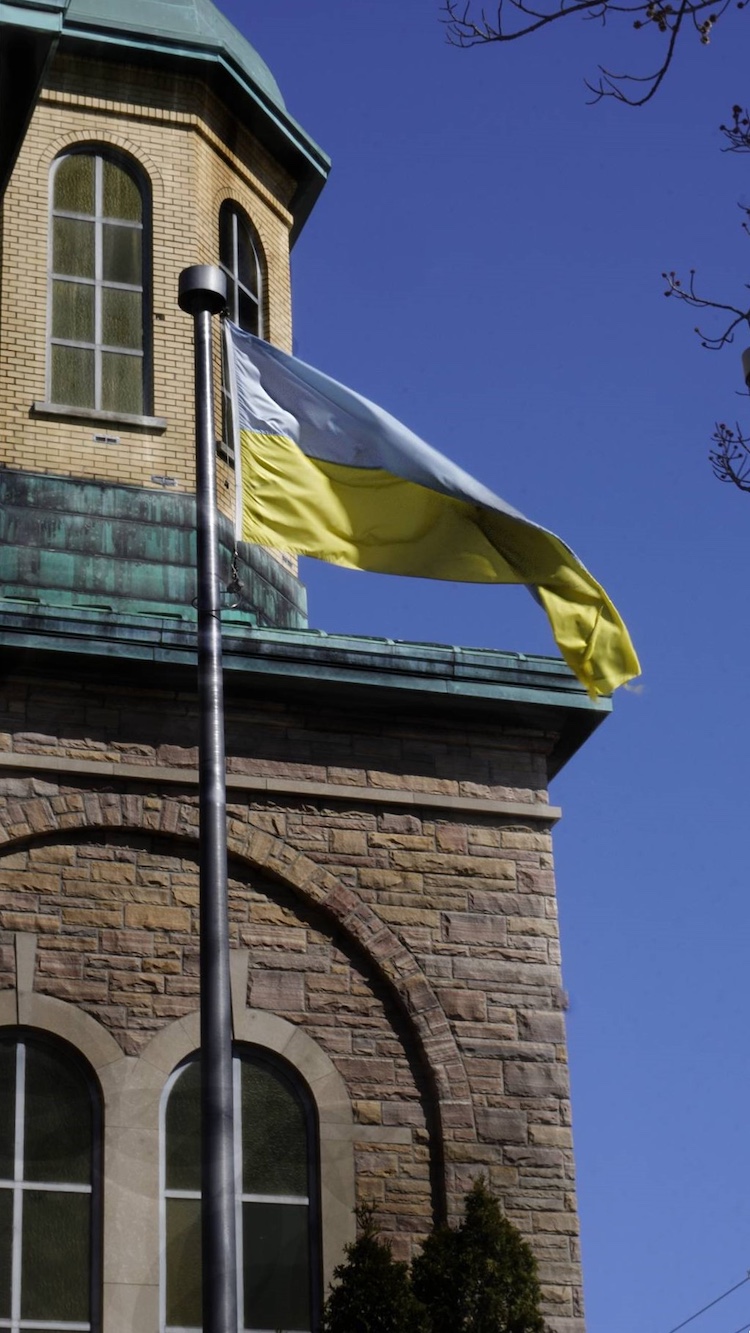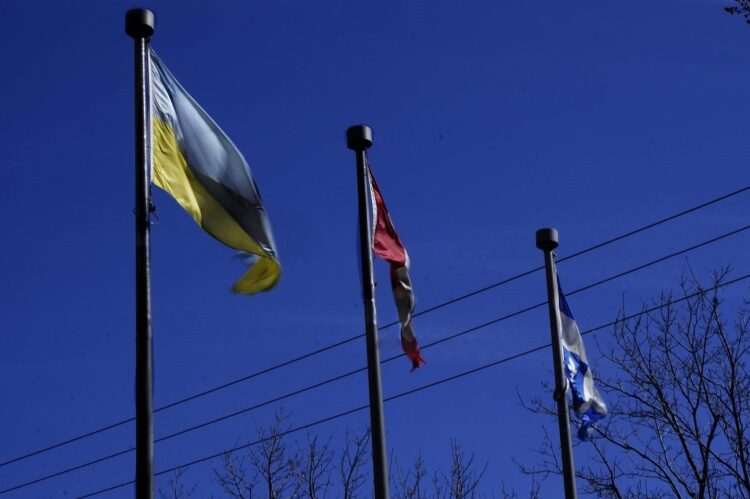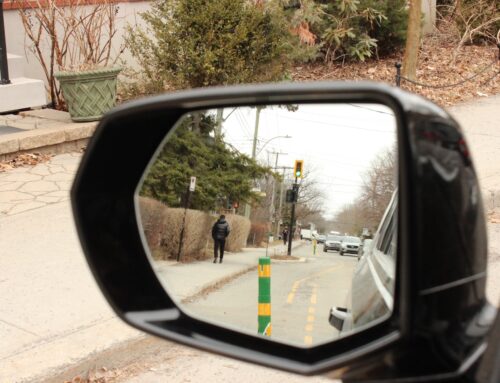BY Camila Lewandowski
Vladyslan Movchan has done everything in his power to stay in Canada: He met with an immigration lawyer, spoke multiple times with Ukrainian officials, and communicated with the Canadian immigration department.
“I don’t want to go back to Ukraine,” he says.
But he might not have a choice, as his Ukrainian passport and Canadian work permit are about to expire.

The Saint Sophie Ukrainian Orthodox Cathedral was one of the first places in Montreal to welcome Ukrainian refugees, in February 2022. Photo by Camila Lewandowski.
Movchan and his girlfriend were some of the first 290,000 Ukrainians to arrive in Canada after Russia’s invasion of Ukraine in February 2022. After applying to the Canada-Ukraine Authorization for Emergency Travel (CUAET), a program that accelerated Ukrainians arrival to Canada, the couple obtained a visa and an open work permit, which allowed them to change jobs as often as they wanted and in the profession they preferred.
They then moved into a friend’s house, in Sherbrooke, where Movchan found a job as a material logistics planner for Bombardier Recreational Products.
Three years later he needs a valid passport to extend his temporary residency and his work permit. Without it, there is little hope that his temporary residency will be extended.
“It’s so sad that because of a passport I cannot stay,” says Movchan, irritated that the renewed passport would have the same information as his expired one. “It’s still going to be the same face, same name, same birthdate.”
He tried contacting the Embassy of Ukraine in Canada multiple times to renew his passport, but no one has given him an appointment.
“It’s impossible to speak with the embassy,” Movchan says. “When you go into their website, their appointment slots are full until the end of the year.”

Elena Gella, the president of the Saint Sophie Ukrainian Orthodox Cathedral, and Irena Gerych have participated in the welcoming of Ukrainian migrants for the past three years. Photo by Camila Lewandowski.
Elena Gella, the president of the Saint Sophie Ukrainian Orthodox Cathedral brotherhood in Montreal’s Rosemont-La-Petite-Patrie borough, says that many parishioners have experienced similar situations.
“The embassy opens their phones only at a certain time each week,” she says. “Some people have tried now for two and three months in a row, and they weren’t able to get on to get a spot.”
The church has welcomed over 60 Ukrainian refugees over the past three years. Many attend the coffee hour meetings on Sunday mornings, after liturgy. During this time, they exchange information on how to navigate Canadian society, whether it is finding an apartment, enrolling their children in elementary school or applying for a work permit.

During coffee hour meetings on Sunday mornings, after liturgy, newcomers exchange information on how to navigate Canadian society. Photo by Camila Lewandowski.
Gella sympathises with Ukrainian refugees.
“Those who want to start a life in Canada are up against a huge hurdle trying to get the documentation and trying to get people to help them,” she says. “It’s really difficult out there.”
The Saint Sophie Ukrainian Orthodox Cathedral has become a safe-space for many Ukrainians who escaped from the war, a space where they can continue to celebrate their country’s traditions, like the baking of paskas, which is a sweet Easter bread.
“It makes them feel closer to home,” Gella says.

The Saint Sophie Ukrainian Orthodox Cathedral has become a safe-space for many Ukrainians who escaped from the war. Here, they can continue to celebrate their country’s traditions, like the baking of paskas, which is a sweet Easter bread. Photo by Camila Lewandowski.
The Embassy of Ukraine in Canada acknowledges that there are significant delays for the renewal of passports. “Unfortunately, our capacity is very limited,” says Olena Bilotserkivska, who works at the Embassy.
“The embassy and the minister of foreign affairs is trying to do the best by increasing the number of people who work in the consulate and in the embassy,” she says.
The current wait times are of six months for an appointment and between one to two months to receive the new passport by the mail, according to Bilotserkivska. Meanwhile, there are over 25,000 Ukrainians whose passports expire this year, according to the Canadian government.
As for Immigration, Refugees, and Citizenship Canada (IRCC), they too are aware of these bureaucratic delays and may waive the requirement of the updated passport on a case-by-case basis, but only under “compelling and exceptional circumstances,” explains Jeffrey MacDonald, a communications advisor at the IRCC.
Applicants who want to extend their stay in Canada must therefore offer a written explanation on why it is impossible for them “to get a passport extended before the expiry date of their current passport and their visitor record, work or study permit,” points out MacDonald. The demand may also include a copy of the expired passport.
This is what Movchan is trying to prove with the help of his immigration lawyer.
“My lawyer is helping me demonstrate to the Canadian government that it’s impossible to get an updated passport.”
He says that ideally, the embassy will give him a written response refusing to renew his passport, which will be an undeniable proof of his claim. But he doubts it will ever happen.
Canada has paused deportations of Ukrainians who no longer have a valid work or study permit because of the ongoing war.
“(Applicants) may qualify for a non-status work permit, and remain in Canada as long as the administrative deferral of removals is in place,” says MacDonald. “However, those who are not allowed in Canada for security reasons or on grounds of criminality, international or human rights violations, or organized crime can still be removed despite the administrative deferral of removals.”
Ukrainians are in a tricky situation, as they hold a status that no other group has held before, according to Adele Garnier, the director of the undergraduate geography program at Université Laval and a Researcher into global migration patterns.
“In Canada, temporary protection is quite unusual,” she says. “Usually, people either come with a refugee claim or they arrive with a refugee status.”
An overview of Canadian policies targeting Ukrainian immigrants. Infographic by Camila Lewandowski.
Temporary residency was given to Ukrainians at the beginning of the war with Russia and the federal government assumed that they would all return to Ukraine once the country recovered, Garnier says. But most want to stay in Canada and now have to deal with the different access routes to permanent residency that are incompatible with their immigration status. She also warns that this could result in precarity and a succession of temporary statuses that could last for years.
Garnier has conducted research on Ukrainian refugees’ migration patterns and found that 90 per cent of them want to stay in Canada and ask for permanent residency. Movchan is one of them.
“I really like this country,” he says. “And I would like to apply for permanent residency, but to apply I need a valid six-month passport.”
“It’s really frustrating,” he says.




